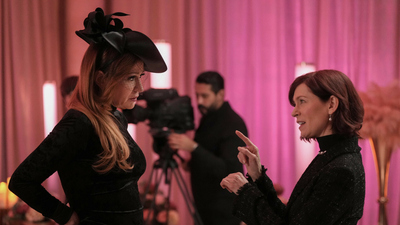
Why Everyone Is Talking About Elsbeth: Latest Episode Leaves Viewers Speechless
In a television landscape often dominated by gritty realism, complex anti-heroes, and dark, brooding mysteries, Elsbeth sashays onto the screen like a brightly colored beacon. Spinning off from The Good Wife and The Good Fight, the series brings back Carrie Preston's titular character, Elsbeth Tascioni, a disarmingly quirky, perpetually optimistic, and secretly brilliant attorney from Chicago, now transplanted to New York City to serve as an independent observer for the NYPD. It's a procedural, yes, but one seen through a kaleidoscope of Midwestern charm and razor-sharp intellect. And while the show has consistently delivered its unique blend of wit, warmth, and surprising investigative prowess, its latest episode didn't just entertain; it genuinely left viewers speechless, a collective gasp echoing through social media.
From its very first episode, Elsbeth distinguished itself. Unlike traditional whodunits, it’s a "how-they-dun-it," revealing the killer at the top of each hour. The tension isn't in guessing who but in watching Elsbeth, with her brightly patterned scarves, peculiar observations, and seemingly innocent questions, meticulously deconstruct the meticulously laid plans of the week's antagonist. She's a modern-day Columbo, disarming her targets with a smile and a folksy anecdote, all while her mind, a finely tuned instrument, pieces together the invisible threads of a crime. This unique structure, coupled with vibrant New York City backdrops, a delightful supporting cast, and Preston's masterful performance, built a loyal following. Viewers tune in for the comforting rhythm, the inevitable moment Elsbeth's genial façade drops just enough to reveal the steel beneath, and the satisfying delivery of justice.
The "speechless" buzz around the latest installment wasn't a sudden departure from this formula, but rather its most potent, exquisitely executed iteration yet. The episode had all the hallmarks: a high-profile killer – in this case, a seemingly unassailable media mogul known for his philanthropic endeavors and impenetrable public image. He was charming, arrogant, and utterly convinced of his own untouchability, weaving a web of lies so intricate it seemed impossible to unravel. As Elsbeth, with her usual blend of wide-eyed curiosity and pointed inquiries, circled her prey, the audience braced for the inevitable "gotcha" moment. We expected her to find the overlooked detail, the tiny inconsistency that would bring his empire crashing down.
What transpired, however, transcended the typical reveal. The mogul, secure in his perceived victory, had orchestrated a public display designed not just to absolve him, but to utterly discredit Elsbeth, making her out to be a bumbling, well-meaning fool. He even set up a live broadcast, ostensibly a press conference, but actually a trap to humiliate her on a grand stage. As the camera rolled and the mogul, smug and self-satisfied, prepared to deliver his devastating monologue, Elsbeth simply looked at him. Not with anger, not with accusation, but with a quiet, almost pitying understanding.
Then, she spoke. Not a shouted accusation, not a grand expose, but a series of seemingly innocuous questions, each one subtly yet surgically dismantling his fabricated narrative. She didn't reveal a hidden camera or a secret witness; she simply pointed out the logical inconsistencies inherent in his own words, the very foundation of his alibi. She used his own arrogance, his own meticulously crafted lies, as the tools of his undoing. The mogul's face, initially contorted in a triumphant sneer, slowly crumbled into genuine terror as he realized, live on air, that he hadn't just been caught – he had been utterly, irretrievably exposed by the very person he had so condescendingly underestimated. The true "speechless" moment came not from Elsbeth's pronouncements, but from the mogul's dawning, horrifying realization that his entire world was collapsing around him due to his own hubris, expertly highlighted by a woman he dismissed as merely "quaint." The scene ended not with a dramatic arrest, but with the silent, psychological implosion of a powerful man, his public persona shattered, his guilt undeniable even without a single piece of damning physical evidence.
The aftermath of this episode was an immediate explosion of online chatter. Viewers weren't just discussing the plot; they were dissecting the method. "Did you SEE his face?!" "I literally gasped!" "She didn't even raise her voice!" The consensus was clear: this wasn't just another win for Elsbeth; it was a masterclass in understated power, a testament to the idea that true strength lies not in force, but in intellect and observation. It validated everything fans love about the show and its protagonist: her uncanny ability to see what others miss, her unwavering moral compass, and her quiet, devastating effectiveness. It proved that in the right hands, a gentle smile and a well-placed question can be far more powerful than any dramatic monologue or high-speed chase.
In a world clamoring for noise, Elsbeth offers the profound satisfaction of quiet observation and meticulous unraveling. The latest episode, in particular, solidified the show's unique place, demonstrating that true dramatic impact isn't always about shocking twists or violent confrontations. Sometimes, it's about the subtle shift in an antagonist's eyes, the dawning horror as their carefully constructed reality crumbles under the gentle, yet relentless, scrutiny of a woman in a colorful scarf. It reminded us that the most powerful moments often leave us speechless, not because of what we hear, but because of the profound realization of what we've just witnessed. And for Elsbeth Tascioni, that is perhaps the greatest victory of all.
